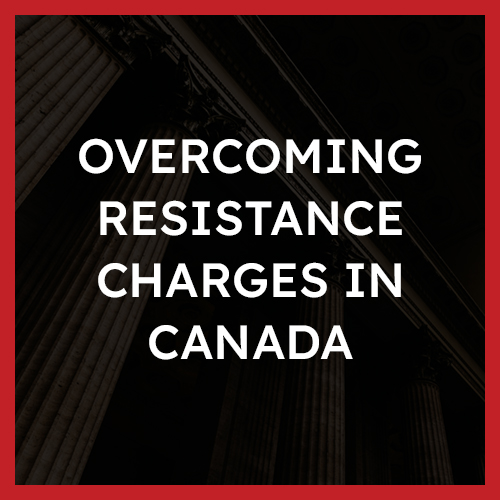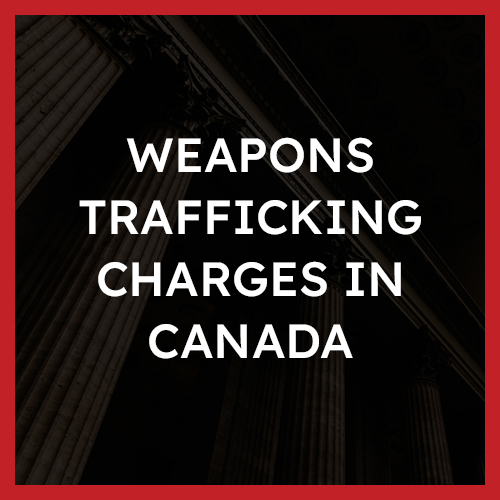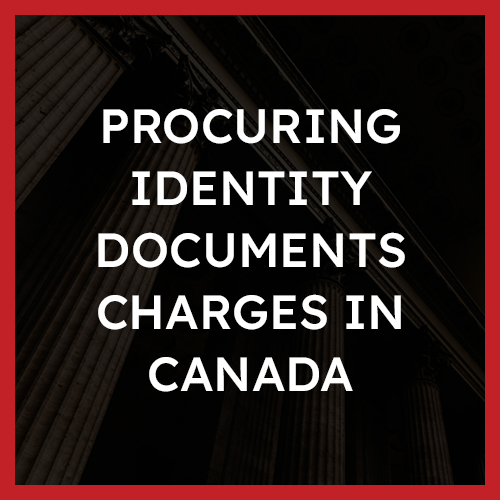Overcoming Resistance (s. 246) Charges in Canada: Offences, Defences, Punishments
What is an Overcoming Resistance charge?
 In Canada, the offence of overcoming resistance is a serious criminal offence that can be laid in conjunction with other charges such as assault, assault with a weapon, and sexual assault. This charge can be added when someone chokes, strangles, suffocates, or otherwise incapacitates another person in order to commit another offence. The act of choking can be particularly serious and can result in severe injury or death.
In Canada, the offence of overcoming resistance is a serious criminal offence that can be laid in conjunction with other charges such as assault, assault with a weapon, and sexual assault. This charge can be added when someone chokes, strangles, suffocates, or otherwise incapacitates another person in order to commit another offence. The act of choking can be particularly serious and can result in severe injury or death.
The offence of overcoming resistance carries a maximum penalty of life imprisonment and can result in an automatic criminal record, impacting an individual’s personal and professional life. The Crown must prove that the accused had the specific intent to commit the underlying offence and that the use of force or threats of force were connected to the commission of that offence.
Common charges associated with overcoming resistance are aggravated assault, assault and sexual assault. Overcoming resistance is different from these charges in that it does not occur in isolation. It is an additional charge which may be laid in conjunction with them.
Examples
An overcoming resistance charge is made in addition to another charge, meaning it does not occur in isolation. It refers to the choking of someone for the purpose of hindering them so that they may commit another crime. Examples of situations that may lead to being charged with overcoming resistance include:
- Choking someone to facilitate a sexual assault on them.
- A person resists arrest by a police officer and chokes the officer while attempting to escape.
- During a domestic dispute, one partner chokes the other to the point of unconsciousness to prevent them from leaving or calling for help.
- During a physical altercation between two individuals, one person chokes the other to gain the upper hand in the fight.
Defences
The success of these defences will depend on the specific circumstances of each case, and the availability of these defences may vary from case to case.
Common defences for a charge of overcoming resistance include proving:
- The accused was only acting in self-defence,
- The accused did not mean to commit the choking,
- The facts put forward by the prosecution do not line up,
- The accused had honest but mistaken consent, or
- The accused’s Charter rights were infringed.
Punishment
The maximum punishment for an overcoming resistance charge is life in prison and an automatic criminal record. The exact length varies depending on the nature of the associated crime.
The punishments for the related crimes can be carried out in three different ways:
- concurrently (at the same time)
- consecutively (one after another), or
- only the sentencing from the primary offence.
Overview of the Offence
Under s. 246 of the Criminal Code:
246 Everyone who, with intent to enable or assist himself or another person to commit an indictable offence,
(a) attempts, by any means, to choke, suffocate or strangle another person, or by any means calculated to choke, suffocate or strangle, attempts to render another person insensible, unconscious or incapable of resistance, or
(b) administers or causes to be administered to any person, or attempts to administer to any person, or causes or attempts to cause any person to take a stupefying or overpowering drug, matter or thing, is guilty of an indictable offence and liable to imprisonment for life.
Section 246 of the Canadian Criminal Code defines the offence of “overcoming resistance to the commission of an offence,” which includes the specific offence of “strangling.” This offence occurs when an individual intentionally chokes or strangles another person to the point of unconsciousness or causing bodily harm.
The Guilty Act (Actus Reus)
The actus reus (or the physical element) of this offence involves the use of force or threats of force to overcome the resistance of another person who is resisting the commission of an offence, or who is attempting to prevent the commission of an offence.
For example, if a person tries to steal someone’s purse and the victim resists, but the thief uses choking to subdue the victim so they can take it, then the thief has committed the offence of overcoming resistance. The key element is that the victim was actively resisting, and the thief used choking or threats of choking to overcome their resistance.
Police investigators typically inquire about whether the accused individual grabbed the alleged victim by the throat during interviews, and this information may also be provided by third parties, such as relatives, friends, or doctors.
To be convicted of this offence, the Crown must prove that this act occurred.
The Guilty Mind (Mens Rea)
In addition to the actus reus, or physical element, of the offence of overcoming resistance under section 246 of the Canadian Criminal Code, there is also a mens rea, or mental element, that must be proven in order to obtain a conviction.
The mens rea for this offence requires that the accused had the specific intent to commit the primary offence and that the use of choking or threats of choking was connected to the commission of that offence. This means that the accused must have intended to choke or intend to threaten choking to overcome the victim’s resistance to commit the primary offence. Put differently, it is the ulterior purpose for the use of choking, suffocating or strangling.
For example, if the accused intended to steal someone’s purse and intended to choke them to overcome the victim’s resistance, then the accused would have the mens rea for both the offence of theft and the offence of overcoming resistance.
The Crown must prove beyond a reasonable doubt that the accused had the necessary intent and that the use of choking or threat of choking was not accidental or otherwise incidental to the commission of the primary offence. If the Crown fails to prove the mens rea, the accused cannot be convicted of this offence.
Defences
An overcoming resistance charge is sometimes used as a bargaining tool by the Crown to obtain a guilty plea for the primary offence, negotiate sentencing, or include mandatory counselling or addiction services.
If the charge is not dropped by the prosecution, there are various defence options. However, the availability and success of these defences will depend on the specific circumstances of each case.
Missing intention
Another available defence could be if you can prove you did not mean to commit the choking. A lack of intent cannot result in a conviction for a charge of overcoming resistance. Additionally, if you can show that there was no intent for the primary offence, you cannot be convicted for overcoming resistance.
Mistake in facts
Being able to show that the facts put forward by the prosecution do not line up is another way to get an overcoming resistance charge dropped. This could mean proving you were not actually the one who committed it or that the timeline does not add up.
Honest but mistaken consent
If the alleged victim consented to the choking, this could be a valid defence. However, this defence is only applicable in limited circumstances and requires careful consideration by a qualified criminal defence lawyer.
Violation of the Charter of Rights and Freedoms:
Lastly, showing the charge violates your rights under the Charter of Rights and Freedoms can be used as a defence against an overcoming resistance charge. This could mean showing that the police officers acted in breach of the Charter, such as conducting an illegal search and seizure. A Charter violation may result in some or all of the evidence collected by the police being excluded under s. 24(2) of the Charter.
Punishments
The maximum punishment for an overcoming resistance charge is life in prison and an automatic criminal record. The exact length varies depending on the nature of the primary crime. This punishment is in addition to the sentencing for the primary offence. If the offence is committed with a weapon or results in the death of the victim, the penalty can be life imprisonment.
- Since there are multiple sentences to be considered, there are three ways in which the punishment for an overcoming resistance charge may be served:
- Only the underlying sentence: Instead of adding time specifically for the overcoming resistance charge, the judge may choose to extend the length of the primary offence.
- Concurrently: This means both sentences are served at the same time. When this occurs, the judge often extends the overall length of the sentence.
- Consecutively: The sentences are served one at a time, with the overcoming resistance charge following the primary offence.
Frequently Asked Questions
What is overcoming resistance by choking?
Overcoming resistance by choking is when you squeeze or otherwise restrict someone’s airway for the purpose of incapacitating them and intend on committing another crime. Choking someone is considered a heightened form of assault, making it a very serious offence. An additional offence must be committed for there to be a charge or overcoming resistance by choking. Even the attempt to choke someone for this purpose is sufficient for this charge to be laid.
Can you go to jail for an overcoming resistance charge?
Yes. Given the seriousness of the charge, jail is a very likely outcome if found guilty.
Is overcoming resistance a serious offence in Canada?
Overcoming resistance is a very serious charge in Canada, so even first-time offenders often receive jail time and a criminal record. The seriousness of the offence is reflected in its punishment. If you are facing charges related to choking or strangulation, you should seek legal advice from a qualified criminal defence lawyer. A lawyer can review your case, advise you on your rights and options, and help you build a strong defence strategy. It is important to take these charges seriously, as a conviction can result in severe penalties and have long-lasting consequences on your personal and professional life.
Published Decisions
R v. Francisco, 2005 MBCA 110 (CanLII)
The accused was a first-time offender who pled guilty to assault and overcoming resistance. The accused choked his wife as way to subdue her while he further assaulted her through punching and slapping. The attack was witnessed and reported by their daughter.
The accused pled guilty to assault and choking her to overcome resistance. On appeal, his sentence of 11 months in prison was reduced to 4 months in prison and two years of supervised probation. The MBCA held that because he was a first-time offender and expressed significant remorse, the jail time should be reduced. It was also noted that neither the trial judge nor the Crown expressly linked the choking to an additional crime.
You can read the full decision here.
R v. M.J.H., 2021 ONCA 133 (CanLII)
The accused was charged with sexual assault and overcoming resistance. After meeting for a date and then going back to the accused’s condo for a couple drinks, the victim testified that she quickly became very intoxicated. The accused then choked and had intercourse with her, despite her testifying that she had not given consent.
The Court found the accused guilty of sexual assault but not of overcoming resistance. This was due in part to the consideration that the choking must be done for the purpose of committing another offence, which the jury did not find to be the case. There is no way to know exactly why the jury did not find the accused guilty of this additional charge other than that they were not convinced of the evidence put forward by the Crown.
You can read the full decision here.
R v. Gairdner, 2017 BCCA 425 (CanLII)
What happened? The accused was appealing his convictions for overcoming resistance and sexual assault. The accused engaged in sexual activity with a woman wherein she asked the accused to stop multiple times. He claimed that due to the ‘BDSM’ nature of the acts they were engaging in, she was not seriously revoking her consent. The accused then choked her and continued with the sexual acts.
The defence of honest but mistaken belief of consent was attempted to get the charges dropped. To show that the sexual activity was consensual would negate the sexual assault charge, which was required for the overcoming resistance charge. The Court ruled that the accused should have known that the consent was withdrawn so the defence of honest but mistaken belief was not applicable, and his conviction was upheld.
You can read the full decision here.
About The Author
Ask A Question
We endeavor to respond to questions within 24 hours. If your matter is urgent, please call our office or submit a request for a free consultation.







